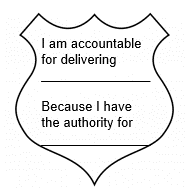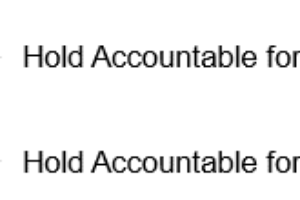
Authority is the recognized power and right to give orders, make decisions, grant rewards, and enforce consequences.
Primary Implication
With authority comes accountability for results. It’s impossible to hold people accountable for results if you fail to delegate to them the necessary authority to accomplish what you are holding them accountable to achieve.
If you don’t want to be in the middle of everything, stop making all the decisions on what and how to do things. Undermine the authority of those working for you means you own the result of the actions taken by your decisions. Going forward, you are limited to holding them accountable for doing what you told them to do.
Overview
Authority holds the right to command a situation, commit resources, give orders and expect them to be obeyed. It is always accompanied by the accountability for the results of one’s actions or a failure to act.
Authority delegated formally in a particular job, function, or position is meant to enable its holder to successfully carry out their accountabilities. In delegating authority it is important that the delegator provide the direct issuance of instructions to the delegate of what the limits of their authority are.
It is also important that the delegator of authority not undermine the manager by bypassing the chain of command unless its life or death. Anytime an owner or higher-level manager bypasses the authority of a manager they destroy the authority they have been extended; simultaneously diminishing their sense of accountability for achieving results. Accountability, or who owns the results, rests with the person issuing the direct orders.
It’s never a good situation whenever you feel you have to step in to direct the subordinates of another manager. It is better to remove a manager you have to constantly step in for from a management role if you are not prepared to extend them the following considerations:
- Defined accountability and authority over all personnel, equipment, and facilities for which they are accountable for achieving specific results.
- The full support of their manager whenever an employee is judged unsatisfactory and must be transferred or terminated.
- Be expected to develop and maintain a high standard of morale and production. Consequently, they must be fully familiar with all company policies and feel they will be supported when they correct for policy and practice infractions as they arise.
- Be required to make recommendations concerning subordinate employees. Be clear with them who has the authority to hire, promote, demote, discipline, or terminate any employee under their authority so that there is no confusion.
